仁爱科普版(2024)七年级英语上册Unit 1 Let's Be Friends知识点
文档属性
| 名称 | 仁爱科普版(2024)七年级英语上册Unit 1 Let's Be Friends知识点 | 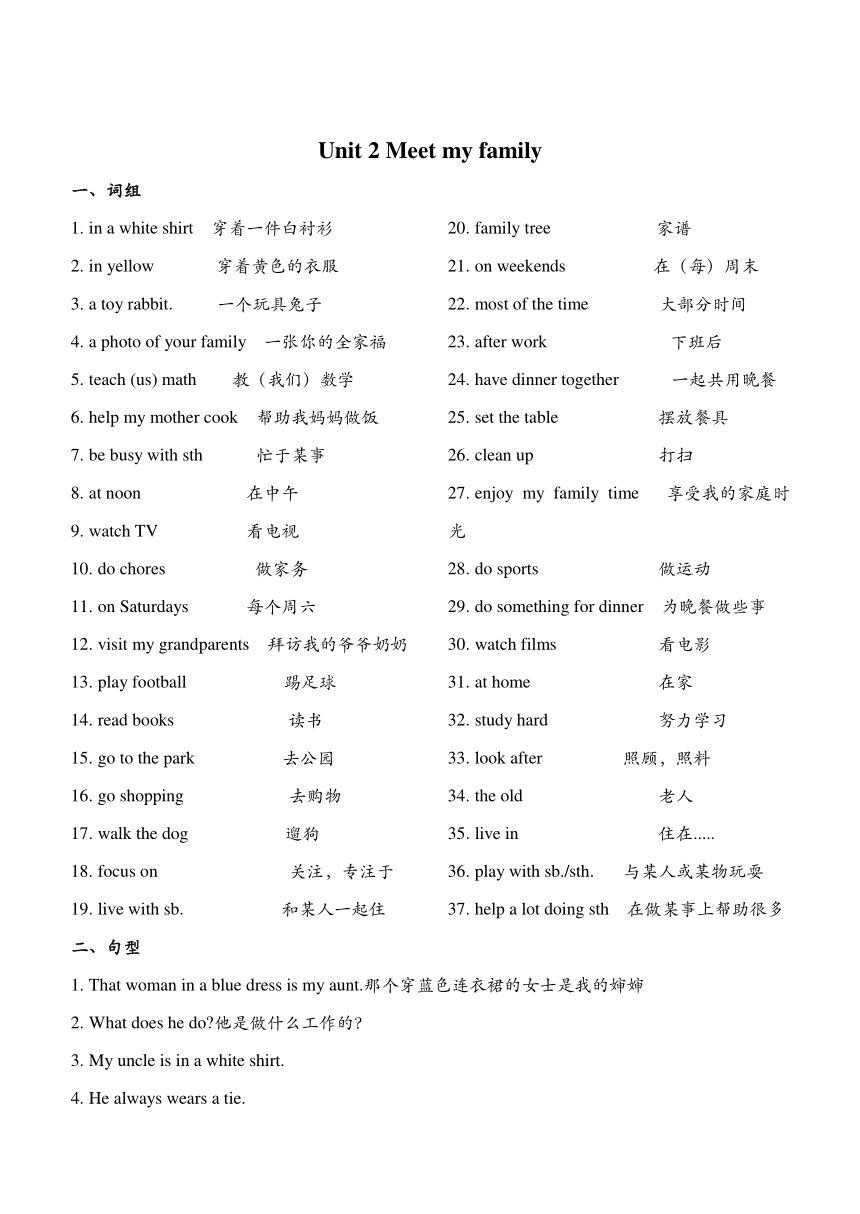 | |
| 格式 | docx | ||
| 文件大小 | 2.3MB | ||
| 资源类型 | 教案 | ||
| 版本资源 | 仁爱科普版 | ||
| 科目 | 英语 | ||
| 更新时间 | 2024-09-22 15:55:27 | ||
图片预览

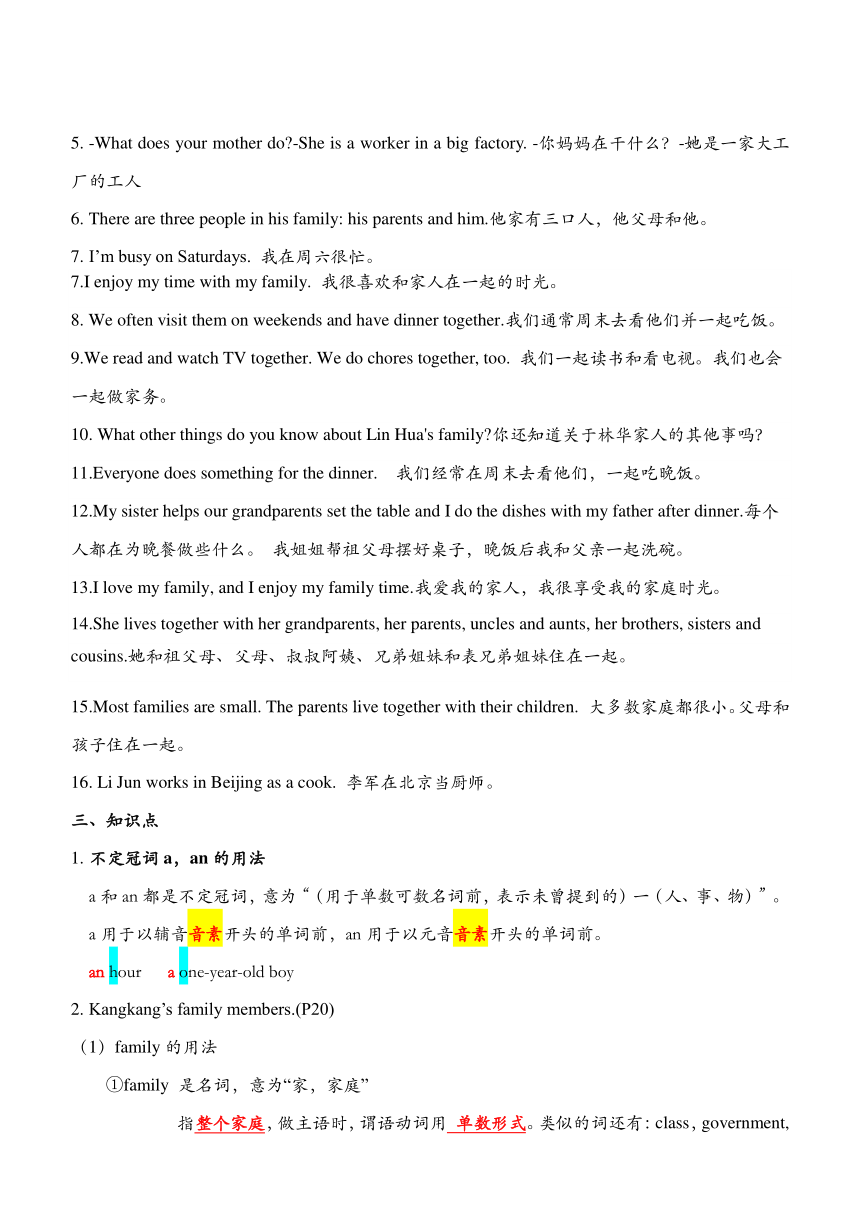
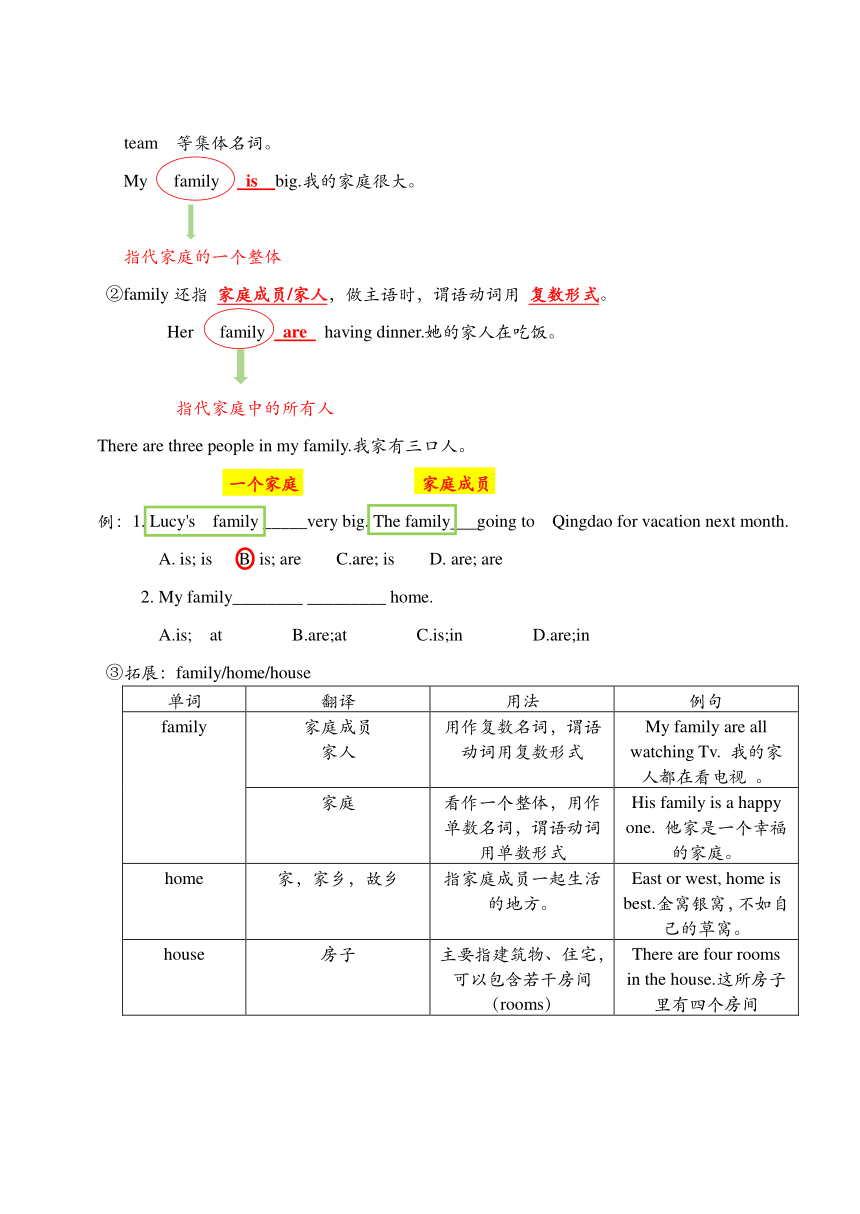
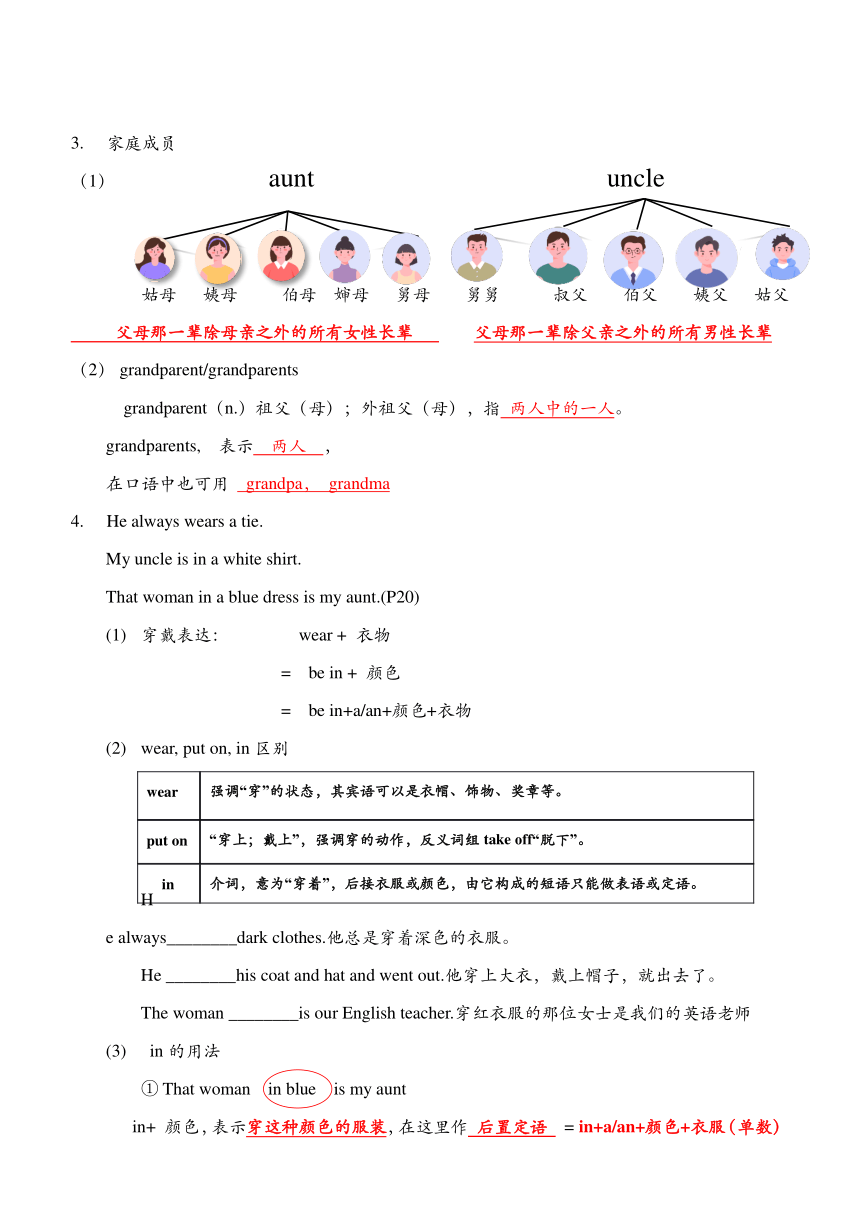
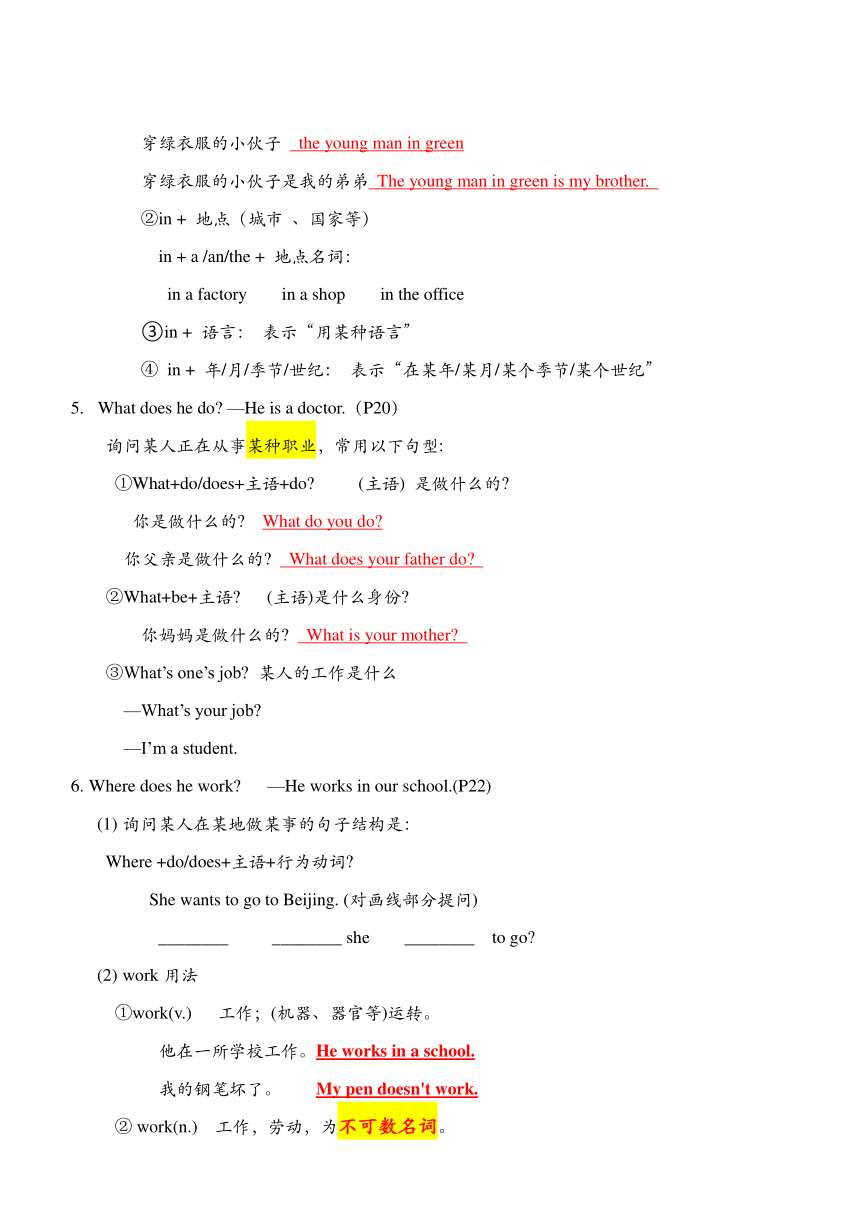
文档简介
Unit 2 Meet my family
词组
in a white shirt 穿着一件白衬衫
in yellow 穿着黄色的衣服
a toy rabbit. 一个玩具兔子
a photo of your family 一张你的全家福
teach (us) math 教(我们)数学
help my mother cook 帮助我妈妈做饭
be busy with sth 忙于某事
at noon 在中午
watch TV 看电视
do chores 做家务
on Saturdays 每个周六
visit my grandparents 拜访我的爷爷奶奶
play football 踢足球
read books 读书
go to the park 去公园
go shopping 去购物
walk the dog 遛狗
focus on 关注,专注于
live with sb. 和某人一起住
family tree 家谱
on weekends 在(每)周末
most of the time 大部分时间
after work 下班后
have dinner together 一起共用晚餐
set the table 摆放餐具
clean up 打扫
enjoy my family time 享受我的家庭时光
do sports 做运动
do something for dinner 为晚餐做些事
watch films 看电影
at home 在家
study hard 努力学习
look after 照顾,照料
the old 老人
live in 住在.....
play with sb./sth. 与某人或某物玩耍
help a lot doing sth 在做某事上帮助很多
句型
That woman in a blue dress is my aunt.那个穿蓝色连衣裙的女士是我的婶婶
What does he do 他是做什么工作的?
My uncle is in a white shirt.
He always wears a tie.
-What does your mother do -She is a worker in a big factory. -你妈妈在干什么?-她是一家大工厂的工人
There are three people in his family: his parents and him.他家有三口人,他父母和他。
I’m busy on Saturdays. 我在周六很忙。
7.I enjoy my time with my family. 我很喜欢和家人在一起的时光。
8. We often visit them on weekends and have dinner together.我们通常周末去看他们并一起吃饭。
9.We read and watch TV together. We do chores together, too. 我们一起读书和看电视。我们也会一起做家务。
10. What other things do you know about Lin Hua's family 你还知道关于林华家人的其他事吗?
11.Everyone does something for the dinner. 我们经常在周末去看他们,一起吃晚饭。
12.My sister helps our grandparents set the table and I do the dishes with my father after dinner.每个人都在为晚餐做些什么。 我姐姐帮祖父母摆好桌子,晚饭后我和父亲一起洗碗。
13.I love my family, and I enjoy my family time.我爱我的家人,我很享受我的家庭时光。
14.She lives together with her grandparents, her parents, uncles and aunts, her brothers, sisters and cousins.她和祖父母、父母、叔叔阿姨、兄弟姐妹和表兄弟姐妹住在一起。
15.Most families are small. The parents live together with their children. 大多数家庭都很小。父母和孩子住在一起。
16. Li Jun works in Beijing as a cook. 李军在北京当厨师。
知识点
不定冠词a,an的用法
a和an都是不定冠词,意为“(用于单数可数名词前,表示未曾提到的)一(人、事、物)”。a用于以辅音音素开头的单词前,an用于以元音音素开头的单词前。
an hour a one-year-old boy
Kangkang’s family members.(P20)
family的用法
①family 是名词,意为“家,家庭”
指整个家庭,做主语时,谓语动词用 单数形式。类似的词还有:class,government, team 等集体名词。
My family is big.我的家庭很大。
指代家庭的一个整体
②family还指 家庭成员/家人,做主语时,谓语动词用 复数形式。
Her family are having dinner.她的家人在吃饭。
指代家庭中的所有人
There are three people in my family.我家有三口人。
一个家庭 家庭成员
例:1. Lucy's family _____very big. The family going to Qingdao for vacation next month.
A. is; is B. is; are C.are; is D. are; are
2. My family________ _________ home.
A.is; at B.are;at C.is;in D.are;in
③拓展:family/home/house
单词 翻译 用法 例句
family 家庭成员 家人 用作复数名词,谓语动词用复数形式 My family are all watching Tv. 我的家人都在看电视 。
家庭 看作一个整体,用作单数名词,谓语动词用单数形式 His family is a happy one. 他家是一个幸福的家庭。
home 家,家乡,故乡 指家庭成员一起生活的地方。 East or west, home is best.金窝银窝,不如自己的草窝。
house 房子 主要指建筑物、住宅,可以包含若干房间(rooms) There are four rooms in the house.这所房子里有四个房间
家庭成员
aunt uncle
姑母 姨母 伯母 婶母 舅母 舅舅 叔父 伯父 姨父 姑父
父母那一辈除母亲之外的所有女性长辈 父母那一辈除父亲之外的所有男性长辈
grandparent/grandparents
grandparent(n.)祖父(母);外祖父(母),指 两人中的一人。
grandparents, 表示 两人 ,
在口语中也可用 grandpa, grandma
He always wears a tie.
My uncle is in a white shirt.
That woman in a blue dress is my aunt.(P20)
穿戴表达: wear + 衣物
= be in + 颜色
= be in+a/an+颜色+衣物
wear, put on, in区别
wear 强调“穿”的状态,其宾语可以是衣帽、饰物、奖章等。
put on “穿上;戴上”,强调穿的动作,反义词组 take off“脱下”。
in 介词,意为“穿着”,后接衣服或颜色,由它构成的短语只能做表语或定语。
He always________dark clothes.他总是穿着深色的衣服。
He ________his coat and hat and went out.他穿上大衣,戴上帽子,就出去了。
The woman ________is our English teacher.穿红衣服的那位女士是我们的英语老师
in的用法
① That woman in blue is my aunt
in+ 颜色,表示穿这种颜色的服装,在这里作 后置定语 = in+a/an+颜色+衣服(单数)
穿绿衣服的小伙子 the young man in green
穿绿衣服的小伙子是我的弟弟 The young man in green is my brother.
②in + 地点(城市 、国家等)
in + a /an/the + 地点名词:
in a factory in a shop in the office
③in + 语言: 表示“用某种语言”
④ in + 年/月/季节/世纪: 表示“在某年/某月/某个季节/某个世纪”
What does he do —He is a doctor.(P20)
询问某人正在从事某种职业,常用以下句型:
①What+do/does+主语+do (主语) 是做什么的
你是做什么的 What do you do
你父亲是做什么的 What does your father do
②What+be+主语 (主语)是什么身份
你妈妈是做什么的 What is your mother
③What’s one’s job 某人的工作是什么
—What’s your job
—I’m a student.
Where does he work —He works in our school.(P22)
询问某人在某地做某事的句子结构是:
Where +do/does+主语+行为动词
She wants to go to Beijing. (对画线部分提问)
________ ________ she ________ to go
work用法
①work(v.) 工作;(机器、器官等)运转。
他在一所学校工作。He works in a school.
我的钢笔坏了。 My pen doesn't work.
② work(n.) 工作,劳动,为不可数名词。
我还有很多工作要做。I have much work to do.
③worker(n .) 工人
He's a PE teacher. He teaches Grade Eight.(P22)
①teach动词“教; 教授”。
三单: teaches 名词: teacher
② 教某人某事 teach sb. sth.
教某人做某事 teach sb. to do sth.
自学 teach oneself
在“教某人某科目”中,某人应该使用人称代词的宾格。
“教我们英语”,应说成teach us English
hospital/ school用法(P22)
①in a hospital 指“在医院里”,指地点概念。
in hospital 指 “因病住在医院里”。
他生病住院。 He is ill in hospital.
他在医院里。 He is in a hospital.
② go to school 上学 at school上学
go to the school 去某个学校 at the school在学校里
他在上学。(专门指学习) He is at school.
他在学校里。(未必是去读书). He is at the school.
I'm busy on Saturdays.(P24)
busy adj. 忙碌的 ; 反义词free
be busy with sth. 忙于某事......
be busy doing sth. 忙于做某事......
①凯特正忙着写作业。
Kate is busy with his homework.
= Kate is busy doing his homework.
②我有一个忙碌的星期天。
I have a busy Sunday.
On Sundays : Sunday后加’s ,表示 在每一个周日
in+ 年/月/季节/世纪
in, on , at : on + 具体的某天/具体的某天上午(下午、晚上、或夜里)
at+ 具体的时间点
in June on a rainy afternoon at 9:00
备注: A. 不特指某天的“在上午/下午/晚上/白天”, 用介词in.
不特指某天的“在中午/夜里/午夜”, 用介词at
在周末用介词at 和on 均可,at weekends = on weekends
构词法
动词 名词
work worker
drive driver
farm farmer
teach teacher
act actor
She lives with her grandparents, parents, uncles, aunts, brothers, sisters and cousins. Grandparents, parents and children parents and children live together.(P25)
live with + sb. .... 和……住在一起
live in +国家/城市... 居住在......
live in ... with... 和......居住在......
live together 住在一起
with prep.
①跟着......, 和某人一起
汤姆经常和他的朋友们一起打篮球。Tom often plays basketball with his friends
②用某种工具
你可以用钢笔写字。You can write with a pen
③有,具有某物
他有一座带花园的房子。He has a house with a garden
I play basketball with my father in the morning and help my mother cook at noon.(P24)
help v./n. 帮助
help sb. with sth. 在某方面帮助某人
help sb. (to) do sth. 帮助某人做某事
help (to) do sth. 帮助做某事
我经常帮助我的妈妈做家务。
I often help my mother do chores = I often help my mother with the chores
helpful adj. 有帮助的,有用的;愿意帮忙的
她总是爱帮助人。She is always helpful.
They are very busy most of the time. But after work, we do many things together.
(1) most... & most of... ......中的大部分(修饰可数名词复数)
A.没有限定词
如所修饰的的名词前没有限定词,通常用most.
有限定词(注意代词前,只用most of)
如所修饰的的名词前有限定词,通常用the most.
这里大部分的人是来自中国。Most (of the) people here are from China.
他们大多数人都吃太多肉了。Most of them eat too much meat.
(2) after的用法
(1)时间或者顺序上的“在......之后”
下班后 after work
晚餐后 after dinner
在十点钟之后 after ten o’clock
下课后 after class
他们放学之后在操场踢足球。They play football on the playground after school.
after + Ving
After reading the letter, he threw it in the waste-paper basket.
We often visit them on weekends and have dinner together.
weekends & weekdays
在工作日 on weekdays
在周末 on/at weekends
dinner的用法
dinner是名词,指一日之中较丰富的正餐(午餐或晚餐)。在欧美国家里,晚餐是最丰盛的,因此dinner常用来指晚餐。
breakfast 早餐 一顿饭 meal
lunch 午餐
supper 晚餐
dinner(中午或晚上吃)正餐
have后接三餐名词,名词前不加冠词。
吃晚饭have dinner
We all do something for dinner. (P26) 我们都为晚餐做点什么。
something 用法
“某事,某物”,用于肯定句
something + 形容词: ....的事/物
我有重要的事告诉你。
I have something important to tell you.
My parents cook the food. (P 26)我父母做饭
cook & cooker:
cook 名词(n.) 炊事员,厨师
动词(v.) 烹调,煮
cooker 名词(n.) 炊具,锅
他做饭很好,他是一个厨师。
He cooks very well and he is a cook .
My parents cook the food. My sister helps our grandparents set the table and I clean up with my father after dinner.
clean的用法
形容词( adj.) 干净的
动词(v.) 清洁,清理
午饭后我和爸爸一起打扫卫生。(v.) After lunch I clean up with my father.
汤姆的房间真干净。 (adj.) Tom's room is so clean.
(2)set the table 摆饭桌
18.
(1)drive & driver
drive 动词(v.) 驾车
driver 名词(n.) 司机
我父亲是一个司机,他每天开公交车。 My father is a driver. He drives a bus every day.
①How about... = What about... ...怎么样?...好不好?
② How/What about +名词/代词/V-ing
我喜欢苹果,你呢?I like apples, what about you
今天上午去购物怎么样? What/How about going shopping in the morning
police & policeman & policewoman
police 名词(n.) 警察(集体名词)
作主语谓语动词用复数
policeman (复:policemen) 名词(n.) 具体的某一个(男)警察
policewoman (复:policewomen) 名词(n.) 具体的某一个女警察
help sb. (to) do sth. 帮助某人做某事
help sb. with sth. 在某方面帮助某人 help v. 动词
help sb 帮助某人
with one’s help/ with the help of sb. 在某人的帮助下 help n. 名词
ask sb. for help. 向某人求助
often & usually& always
often 副词adv.频度副词 常常,时常
usually 通常地
always 总是
位置:实义动词之前,be之后
他总是帮助我。 He always helps me.
他总是乐于助人的。He is always helpful.
sound用法
sound 动词(v.) 听起来(感官动词)+adj.
名词(n.) 声音,声响
这音乐听起来很美妙。 The music sounds beautiful.
我能听到流水的声音。 I can hear the sound of running water.
Let me tell you about my family.
let的用法
let’s do sth. 让我们做某事(包括说话者) let sb. do sth. 让某人做某事
let us do sth. 让我们作某事(不包括说话者)
Tell 的用法
tell sb. sth= tell sth .to sb 告诉某人某事
tell sb (not) to do sth 告诉某人(不)做某事
tell sb about sth 告诉某人关于某事
tell a stroy/stories 讲故事
请告诉我你的电话号码.
Please tell me your telephone number. = Please tell your telephone number to me!.
We often do sports in the afternoon, such as running and swimming. Sometimes, we watch films at home.
(1)such as 例如
① such as+名词/名词短语,不接句子
② such as+ V-ing
孩子们喜欢球类运动,例如篮球、足球和乒乓球。
Children likes ball games, such as basketball, football and table tennis.
他们喜欢户外活动,比如徒步旅行,跑步和游泳。
They enjoy outdoor activities, such as hiking, running and swimming.
含“some+time”的词汇
sometimes 有时,相当于at times,表示频率
sometime 某个时候,表示将来或过去某个不确定的时间
some times 几次,几倍,表次数或倍数
Father______ goes to the gym with me although he dislikes going there.
never B.hardly C.seldom D.sometimes
watch/look/see/read 区别
watch: 意为“注视,观看”;
①watch TV看电视 ②watch the football game看足球比赛
look: 强调动作,不注重结果,后接宾语时,常与at连用。
see: “看见,看到”,强调看的结果。
①see the doctor看医生 ②see a film/movie看电影
read: “看书,看报,看杂志”
①read a book看书 ②read a newspaper看报纸
21.They help a lot in looking after the family. 他们在照顾家庭方面帮了很多忙
a lot/a lot of
a lot of=lots of +名词复数/不可数名词
a lot 很;非常 修饰动词,放在句末
many 许多 +名词复数
much 许多 +不可数名词
I have a lot of/lots of/many apples.
I can learn a lot from my mother.
I have a lot of/lots of/much bread.
look after 照顾
in + Ving 在做.....方面
She looks nice in white.
(1)look 相关的短语
(2)look的用法
“看起来......”后接形容词
系动词 如:她的妈妈看上去很年轻。
Her mother looks very young.
“看”,当表达看什么时要跟介词at
Look 实义动词 如:看这一张照片,它是一张我的全家福。
Look at the picture, it’s a picture of my family.
“外貌,长相”,常用复数。
名 词 如: 我们长相不同。
We have different looks.
All families are different. (P25)
different: adj. 不同的 difference: n . 不同
be different from .... 不同于.......; 与......不同
My shirt is different from yours.
表达“在哪里做.....工作”
(1)Sb. Works in + 地点 +as + a + 职位
如: He work in Beijing as a cook.
(2)Sb. V. sth in + 地点
如: He drives a bus in Shenzhen.
(3)Sb. be + 职位 + in + 地点
如: He is a teacher in a middle school.
阅读与写作
文章结构
写作
Beginning
My family Body
Ending
人称代词及名词所有格
人称代词:
人称 主格 宾格 形容词性物主代词 名词性 物主代词 反身代词
我 I me my mine myself
你(你们) you you your yours yourself/yourselves
他 he him his his himself
她 she her her hers herself
它 it it its its itself
我们 we us our ours ourselves
他们 they them their theirs themselves
名词所有格s: 名词 + ’s
构成规则:
’s: (1)一般情况下 + ’s
(2)以“s ”结尾的 + ’
(3)2个或2个以上的名词,当表示共同所有时, 则只在最后一个名词隔的词尾 + “’s”
当表示2人或多人各有各的时,需在每一个名词的词尾+ “’s”
如: A and B’s 表示AB两者共有
A’s and B’s 表示A、B各有各的
Of 所有格
名词+ of + 名词
the name of the dog
名词所有格“’s”有时可以与of 所有格互换
This is Alice’s book. = This is the book of Alice.
辨析: a photo of Xiao Xia 一张肖霞的照片(照片上是肖霞)
a photo of Xiao Xia’s 肖霞的一张照片(照片的主人是肖霞)
当名词所有格表示医院、住宅、店铺时, 名词所有格“’s”后通常不加所修饰的名词。
如: This is Michael’s . 这是麦克的家。
词组
in a white shirt 穿着一件白衬衫
in yellow 穿着黄色的衣服
a toy rabbit. 一个玩具兔子
a photo of your family 一张你的全家福
teach (us) math 教(我们)数学
help my mother cook 帮助我妈妈做饭
be busy with sth 忙于某事
at noon 在中午
watch TV 看电视
do chores 做家务
on Saturdays 每个周六
visit my grandparents 拜访我的爷爷奶奶
play football 踢足球
read books 读书
go to the park 去公园
go shopping 去购物
walk the dog 遛狗
focus on 关注,专注于
live with sb. 和某人一起住
family tree 家谱
on weekends 在(每)周末
most of the time 大部分时间
after work 下班后
have dinner together 一起共用晚餐
set the table 摆放餐具
clean up 打扫
enjoy my family time 享受我的家庭时光
do sports 做运动
do something for dinner 为晚餐做些事
watch films 看电影
at home 在家
study hard 努力学习
look after 照顾,照料
the old 老人
live in 住在.....
play with sb./sth. 与某人或某物玩耍
help a lot doing sth 在做某事上帮助很多
句型
That woman in a blue dress is my aunt.那个穿蓝色连衣裙的女士是我的婶婶
What does he do 他是做什么工作的?
My uncle is in a white shirt.
He always wears a tie.
-What does your mother do -She is a worker in a big factory. -你妈妈在干什么?-她是一家大工厂的工人
There are three people in his family: his parents and him.他家有三口人,他父母和他。
I’m busy on Saturdays. 我在周六很忙。
7.I enjoy my time with my family. 我很喜欢和家人在一起的时光。
8. We often visit them on weekends and have dinner together.我们通常周末去看他们并一起吃饭。
9.We read and watch TV together. We do chores together, too. 我们一起读书和看电视。我们也会一起做家务。
10. What other things do you know about Lin Hua's family 你还知道关于林华家人的其他事吗?
11.Everyone does something for the dinner. 我们经常在周末去看他们,一起吃晚饭。
12.My sister helps our grandparents set the table and I do the dishes with my father after dinner.每个人都在为晚餐做些什么。 我姐姐帮祖父母摆好桌子,晚饭后我和父亲一起洗碗。
13.I love my family, and I enjoy my family time.我爱我的家人,我很享受我的家庭时光。
14.She lives together with her grandparents, her parents, uncles and aunts, her brothers, sisters and cousins.她和祖父母、父母、叔叔阿姨、兄弟姐妹和表兄弟姐妹住在一起。
15.Most families are small. The parents live together with their children. 大多数家庭都很小。父母和孩子住在一起。
16. Li Jun works in Beijing as a cook. 李军在北京当厨师。
知识点
不定冠词a,an的用法
a和an都是不定冠词,意为“(用于单数可数名词前,表示未曾提到的)一(人、事、物)”。a用于以辅音音素开头的单词前,an用于以元音音素开头的单词前。
an hour a one-year-old boy
Kangkang’s family members.(P20)
family的用法
①family 是名词,意为“家,家庭”
指整个家庭,做主语时,谓语动词用 单数形式。类似的词还有:class,government, team 等集体名词。
My family is big.我的家庭很大。
指代家庭的一个整体
②family还指 家庭成员/家人,做主语时,谓语动词用 复数形式。
Her family are having dinner.她的家人在吃饭。
指代家庭中的所有人
There are three people in my family.我家有三口人。
一个家庭 家庭成员
例:1. Lucy's family _____very big. The family going to Qingdao for vacation next month.
A. is; is B. is; are C.are; is D. are; are
2. My family________ _________ home.
A.is; at B.are;at C.is;in D.are;in
③拓展:family/home/house
单词 翻译 用法 例句
family 家庭成员 家人 用作复数名词,谓语动词用复数形式 My family are all watching Tv. 我的家人都在看电视 。
家庭 看作一个整体,用作单数名词,谓语动词用单数形式 His family is a happy one. 他家是一个幸福的家庭。
home 家,家乡,故乡 指家庭成员一起生活的地方。 East or west, home is best.金窝银窝,不如自己的草窝。
house 房子 主要指建筑物、住宅,可以包含若干房间(rooms) There are four rooms in the house.这所房子里有四个房间
家庭成员
aunt uncle
姑母 姨母 伯母 婶母 舅母 舅舅 叔父 伯父 姨父 姑父
父母那一辈除母亲之外的所有女性长辈 父母那一辈除父亲之外的所有男性长辈
grandparent/grandparents
grandparent(n.)祖父(母);外祖父(母),指 两人中的一人。
grandparents, 表示 两人 ,
在口语中也可用 grandpa, grandma
He always wears a tie.
My uncle is in a white shirt.
That woman in a blue dress is my aunt.(P20)
穿戴表达: wear + 衣物
= be in + 颜色
= be in+a/an+颜色+衣物
wear, put on, in区别
wear 强调“穿”的状态,其宾语可以是衣帽、饰物、奖章等。
put on “穿上;戴上”,强调穿的动作,反义词组 take off“脱下”。
in 介词,意为“穿着”,后接衣服或颜色,由它构成的短语只能做表语或定语。
He always________dark clothes.他总是穿着深色的衣服。
He ________his coat and hat and went out.他穿上大衣,戴上帽子,就出去了。
The woman ________is our English teacher.穿红衣服的那位女士是我们的英语老师
in的用法
① That woman in blue is my aunt
in+ 颜色,表示穿这种颜色的服装,在这里作 后置定语 = in+a/an+颜色+衣服(单数)
穿绿衣服的小伙子 the young man in green
穿绿衣服的小伙子是我的弟弟 The young man in green is my brother.
②in + 地点(城市 、国家等)
in + a /an/the + 地点名词:
in a factory in a shop in the office
③in + 语言: 表示“用某种语言”
④ in + 年/月/季节/世纪: 表示“在某年/某月/某个季节/某个世纪”
What does he do —He is a doctor.(P20)
询问某人正在从事某种职业,常用以下句型:
①What+do/does+主语+do (主语) 是做什么的
你是做什么的 What do you do
你父亲是做什么的 What does your father do
②What+be+主语 (主语)是什么身份
你妈妈是做什么的 What is your mother
③What’s one’s job 某人的工作是什么
—What’s your job
—I’m a student.
Where does he work —He works in our school.(P22)
询问某人在某地做某事的句子结构是:
Where +do/does+主语+行为动词
She wants to go to Beijing. (对画线部分提问)
________ ________ she ________ to go
work用法
①work(v.) 工作;(机器、器官等)运转。
他在一所学校工作。He works in a school.
我的钢笔坏了。 My pen doesn't work.
② work(n.) 工作,劳动,为不可数名词。
我还有很多工作要做。I have much work to do.
③worker(n .) 工人
He's a PE teacher. He teaches Grade Eight.(P22)
①teach动词“教; 教授”。
三单: teaches 名词: teacher
② 教某人某事 teach sb. sth.
教某人做某事 teach sb. to do sth.
自学 teach oneself
在“教某人某科目”中,某人应该使用人称代词的宾格。
“教我们英语”,应说成teach us English
hospital/ school用法(P22)
①in a hospital 指“在医院里”,指地点概念。
in hospital 指 “因病住在医院里”。
他生病住院。 He is ill in hospital.
他在医院里。 He is in a hospital.
② go to school 上学 at school上学
go to the school 去某个学校 at the school在学校里
他在上学。(专门指学习) He is at school.
他在学校里。(未必是去读书). He is at the school.
I'm busy on Saturdays.(P24)
busy adj. 忙碌的 ; 反义词free
be busy with sth. 忙于某事......
be busy doing sth. 忙于做某事......
①凯特正忙着写作业。
Kate is busy with his homework.
= Kate is busy doing his homework.
②我有一个忙碌的星期天。
I have a busy Sunday.
On Sundays : Sunday后加’s ,表示 在每一个周日
in+ 年/月/季节/世纪
in, on , at : on + 具体的某天/具体的某天上午(下午、晚上、或夜里)
at+ 具体的时间点
in June on a rainy afternoon at 9:00
备注: A. 不特指某天的“在上午/下午/晚上/白天”, 用介词in.
不特指某天的“在中午/夜里/午夜”, 用介词at
在周末用介词at 和on 均可,at weekends = on weekends
构词法
动词 名词
work worker
drive driver
farm farmer
teach teacher
act actor
She lives with her grandparents, parents, uncles, aunts, brothers, sisters and cousins. Grandparents, parents and children parents and children live together.(P25)
live with + sb. .... 和……住在一起
live in +国家/城市... 居住在......
live in ... with... 和......居住在......
live together 住在一起
with prep.
①跟着......, 和某人一起
汤姆经常和他的朋友们一起打篮球。Tom often plays basketball with his friends
②用某种工具
你可以用钢笔写字。You can write with a pen
③有,具有某物
他有一座带花园的房子。He has a house with a garden
I play basketball with my father in the morning and help my mother cook at noon.(P24)
help v./n. 帮助
help sb. with sth. 在某方面帮助某人
help sb. (to) do sth. 帮助某人做某事
help (to) do sth. 帮助做某事
我经常帮助我的妈妈做家务。
I often help my mother do chores = I often help my mother with the chores
helpful adj. 有帮助的,有用的;愿意帮忙的
她总是爱帮助人。She is always helpful.
They are very busy most of the time. But after work, we do many things together.
(1) most... & most of... ......中的大部分(修饰可数名词复数)
A.没有限定词
如所修饰的的名词前没有限定词,通常用most.
有限定词(注意代词前,只用most of)
如所修饰的的名词前有限定词,通常用the most.
这里大部分的人是来自中国。Most (of the) people here are from China.
他们大多数人都吃太多肉了。Most of them eat too much meat.
(2) after的用法
(1)时间或者顺序上的“在......之后”
下班后 after work
晚餐后 after dinner
在十点钟之后 after ten o’clock
下课后 after class
他们放学之后在操场踢足球。They play football on the playground after school.
after + Ving
After reading the letter, he threw it in the waste-paper basket.
We often visit them on weekends and have dinner together.
weekends & weekdays
在工作日 on weekdays
在周末 on/at weekends
dinner的用法
dinner是名词,指一日之中较丰富的正餐(午餐或晚餐)。在欧美国家里,晚餐是最丰盛的,因此dinner常用来指晚餐。
breakfast 早餐 一顿饭 meal
lunch 午餐
supper 晚餐
dinner(中午或晚上吃)正餐
have后接三餐名词,名词前不加冠词。
吃晚饭have dinner
We all do something for dinner. (P26) 我们都为晚餐做点什么。
something 用法
“某事,某物”,用于肯定句
something + 形容词: ....的事/物
我有重要的事告诉你。
I have something important to tell you.
My parents cook the food. (P 26)我父母做饭
cook & cooker:
cook 名词(n.) 炊事员,厨师
动词(v.) 烹调,煮
cooker 名词(n.) 炊具,锅
他做饭很好,他是一个厨师。
He cooks very well and he is a cook .
My parents cook the food. My sister helps our grandparents set the table and I clean up with my father after dinner.
clean的用法
形容词( adj.) 干净的
动词(v.) 清洁,清理
午饭后我和爸爸一起打扫卫生。(v.) After lunch I clean up with my father.
汤姆的房间真干净。 (adj.) Tom's room is so clean.
(2)set the table 摆饭桌
18.
(1)drive & driver
drive 动词(v.) 驾车
driver 名词(n.) 司机
我父亲是一个司机,他每天开公交车。 My father is a driver. He drives a bus every day.
①How about... = What about... ...怎么样?...好不好?
② How/What about +名词/代词/V-ing
我喜欢苹果,你呢?I like apples, what about you
今天上午去购物怎么样? What/How about going shopping in the morning
police & policeman & policewoman
police 名词(n.) 警察(集体名词)
作主语谓语动词用复数
policeman (复:policemen) 名词(n.) 具体的某一个(男)警察
policewoman (复:policewomen) 名词(n.) 具体的某一个女警察
help sb. (to) do sth. 帮助某人做某事
help sb. with sth. 在某方面帮助某人 help v. 动词
help sb 帮助某人
with one’s help/ with the help of sb. 在某人的帮助下 help n. 名词
ask sb. for help. 向某人求助
often & usually& always
often 副词adv.频度副词 常常,时常
usually 通常地
always 总是
位置:实义动词之前,be之后
他总是帮助我。 He always helps me.
他总是乐于助人的。He is always helpful.
sound用法
sound 动词(v.) 听起来(感官动词)+adj.
名词(n.) 声音,声响
这音乐听起来很美妙。 The music sounds beautiful.
我能听到流水的声音。 I can hear the sound of running water.
Let me tell you about my family.
let的用法
let’s do sth. 让我们做某事(包括说话者) let sb. do sth. 让某人做某事
let us do sth. 让我们作某事(不包括说话者)
Tell 的用法
tell sb. sth= tell sth .to sb 告诉某人某事
tell sb (not) to do sth 告诉某人(不)做某事
tell sb about sth 告诉某人关于某事
tell a stroy/stories 讲故事
请告诉我你的电话号码.
Please tell me your telephone number. = Please tell your telephone number to me!.
We often do sports in the afternoon, such as running and swimming. Sometimes, we watch films at home.
(1)such as 例如
① such as+名词/名词短语,不接句子
② such as+ V-ing
孩子们喜欢球类运动,例如篮球、足球和乒乓球。
Children likes ball games, such as basketball, football and table tennis.
他们喜欢户外活动,比如徒步旅行,跑步和游泳。
They enjoy outdoor activities, such as hiking, running and swimming.
含“some+time”的词汇
sometimes 有时,相当于at times,表示频率
sometime 某个时候,表示将来或过去某个不确定的时间
some times 几次,几倍,表次数或倍数
Father______ goes to the gym with me although he dislikes going there.
never B.hardly C.seldom D.sometimes
watch/look/see/read 区别
watch: 意为“注视,观看”;
①watch TV看电视 ②watch the football game看足球比赛
look: 强调动作,不注重结果,后接宾语时,常与at连用。
see: “看见,看到”,强调看的结果。
①see the doctor看医生 ②see a film/movie看电影
read: “看书,看报,看杂志”
①read a book看书 ②read a newspaper看报纸
21.They help a lot in looking after the family. 他们在照顾家庭方面帮了很多忙
a lot/a lot of
a lot of=lots of +名词复数/不可数名词
a lot 很;非常 修饰动词,放在句末
many 许多 +名词复数
much 许多 +不可数名词
I have a lot of/lots of/many apples.
I can learn a lot from my mother.
I have a lot of/lots of/much bread.
look after 照顾
in + Ving 在做.....方面
She looks nice in white.
(1)look 相关的短语
(2)look的用法
“看起来......”后接形容词
系动词 如:她的妈妈看上去很年轻。
Her mother looks very young.
“看”,当表达看什么时要跟介词at
Look 实义动词 如:看这一张照片,它是一张我的全家福。
Look at the picture, it’s a picture of my family.
“外貌,长相”,常用复数。
名 词 如: 我们长相不同。
We have different looks.
All families are different. (P25)
different: adj. 不同的 difference: n . 不同
be different from .... 不同于.......; 与......不同
My shirt is different from yours.
表达“在哪里做.....工作”
(1)Sb. Works in + 地点 +as + a + 职位
如: He work in Beijing as a cook.
(2)Sb. V. sth in + 地点
如: He drives a bus in Shenzhen.
(3)Sb. be + 职位 + in + 地点
如: He is a teacher in a middle school.
阅读与写作
文章结构
写作
Beginning
My family Body
Ending
人称代词及名词所有格
人称代词:
人称 主格 宾格 形容词性物主代词 名词性 物主代词 反身代词
我 I me my mine myself
你(你们) you you your yours yourself/yourselves
他 he him his his himself
她 she her her hers herself
它 it it its its itself
我们 we us our ours ourselves
他们 they them their theirs themselves
名词所有格s: 名词 + ’s
构成规则:
’s: (1)一般情况下 + ’s
(2)以“s ”结尾的 + ’
(3)2个或2个以上的名词,当表示共同所有时, 则只在最后一个名词隔的词尾 + “’s”
当表示2人或多人各有各的时,需在每一个名词的词尾+ “’s”
如: A and B’s 表示AB两者共有
A’s and B’s 表示A、B各有各的
Of 所有格
名词+ of + 名词
the name of the dog
名词所有格“’s”有时可以与of 所有格互换
This is Alice’s book. = This is the book of Alice.
辨析: a photo of Xiao Xia 一张肖霞的照片(照片上是肖霞)
a photo of Xiao Xia’s 肖霞的一张照片(照片的主人是肖霞)
当名词所有格表示医院、住宅、店铺时, 名词所有格“’s”后通常不加所修饰的名词。
如: This is Michael’s . 这是麦克的家。
同课章节目录
